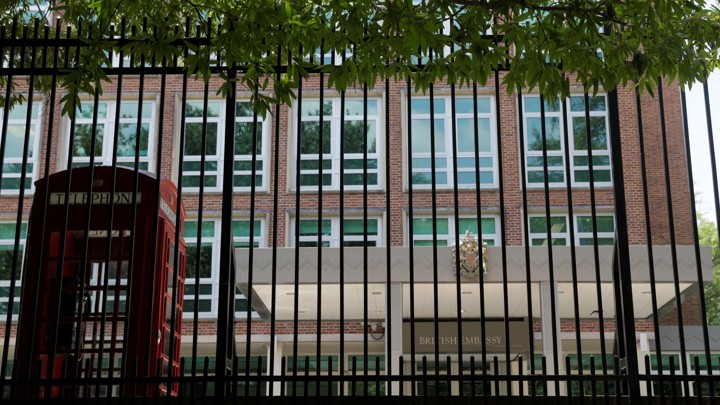Hey there, Meridian Readers! It’s the start of a new week, which means it’s time to catch up on all the happenings of the diplomatic community so you’re ready for any conversation that comes your way. Let’s dive in to this week’s #MeridianReads…
Leaks are changing how diplomats talk
Publication: The Atlantic | By Tom McTague and Prashant Rao 
- With the Darroch scandal, WikiLeaks and the era of cyberwarfare, many diplomats have voiced concern that they are just one disgruntled colleague or successful hack away from the premature end of their careers.
- To avoid professional and personal destruction, several officials are taking to unprecedented methods of communicating sensitive information. Examples:
- Sensitive information, which might previously have been included on cables, is now being copied and pasted into WhatsApp messages and distributed among small circles of trusted officials.
- Important communications are being shared on private email accounts outside the official systems of surveillance.
- Government-issued laptops are being abandoned for the anonymity of airport computer stations to communicate with foreign governments in moments of crisis.
- “In both Washington and London,” Robert Ford, a former U.S. ambassador to Algeria and Syria who is now a senior fellow at the Middle East Institute in Washington, said, “things are more polarized and nasty than even as recently as five years ago.” What happened to Darroch, Ford continued, “could easily happen to American diplomats in a similar position.” Yikes. True, but yikes.
- This breakdown in trust has potentially severe implications for diplomacy, but also for foreign services and the formation of overseas policy more generally if ambassadors feel unable to report the reality on the ground as they see it for fear of causing political upset at home or abroad in the event of a leak.
- In the long term, this shift may have even more profound implications than creating drier, more circumspect cables, as diplomats pursue new and riskier routes or face-to-face briefings outside official channels to protect themselves. Fingers crossed that doesn’t happen.
Rashida Tlaib rejects Israel’s offer of ‘humanitarian’ visit
Publication: BBC
- Haven’t heard about the drama between Congress and Israel? We’ll catch you up:

- US congresswoman Rashida Tlaib and fellow Democratic congresswoman Ilhan Omar planned to make an official visit to the West Bank and East Jerusalem on Sunday. However…
- Under pressure from President Trump, Israel denied permission for the visit to territory it controls.
- A statement from the Israeli interior ministry on Thursday confirmed the entry ban, saying it was “inconceivable that those who wish to harm the state of Israel while visiting would be granted entry.”
- Tlaib and Omar have voiced support for the Boycott, Divestment, Sanctions (BDS) campaign – which aims to put economic pressure on the Israeli government – because of their opposition to Israel’s policies towards Palestinians in the West Bank and Gaza Strip. Now you’re up to speed.
- Israel then changed its mind, saying Tlaib would be permitted to make a “humanitarian” visit to her grandmother in the occupied West Bank. She rejected this offer.
- “Silencing me & treating me like a criminal is not what she wants for me,” Tlaib said of her grandmother. “It would kill a piece of me. I have decided that visiting my grandmother under these oppressive conditions stands against everything I believe in.”
- America stands pretty divided on this; President Trump has a close relationship with Israeli Prime Minister Benjamin Netanyahu and has frequently feuded with Tlaib and Omar, but the two congresswomen have plenty of supporters across the nation. All in all, it’s safe to say this disagreement isn’t ending anytime soon.
A recession will come. How bad will it be?
Publication: The Washington Post | By Andrew Van Dam 
- America hasn’t seen a huge recession since the 2008 financial crisis, but that may change sooner than you think.
- Here’s what’s happening now: Stock markets tanked Wednesday after the bond market sounded a loud warning that the U.S. economy might be headed toward a recession.
- Investors are spooked by a scenario known as the “inverted yield curve,” which occurs when the interest rates on short-term bonds are higher than the interest rates paid by long-term bonds. What it means is that people are so worried about the near-term future that they are piling into safer long-term investments.
- The worst part? No one is sure exactly when this recession will hit. When it does, the unemployment rate will most likely increase by 2.4 percent. Ouch.
- “With rising political polarization and uncertainty, broader fiscal policy could evolve into a risk that at the very least makes a future recession worse,” Goldman’s Jan Hatzius said in February. “By the time the next downturn rolls around, political dysfunction coupled with years of rising deficits might make fiscal policy less effective in spurring economic recovery.” Thanks for the pep talk, Jan.
That’s it for this week, we’ll see you next time.















